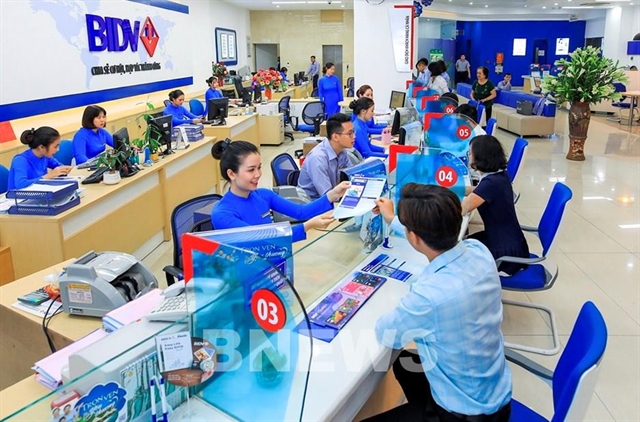Commercial banks have been facing difficulties in recovering bad debts as they were unable to find buyers for high-value collateral despite big discounts.

Commercial banks have been facing difficulties in recovering bad debts as they were unable to find buyers for high-value collateral despite big discounts.
While existing bad debts have not been recovered, new bad debts are tending to increase, which has put great pressure on the banking system.
Information related to debt auctions are posted on banks' websites every month, many of which have been put up for sale dozens of times with prices lowered by hundreds of billions of Vietnamese dong, but only few were sold.
Joint Stock Commercial Bank for Investment and Development of Vietnam (BIDV) has recently announced an auction of the debt of Vertical Synergy Vietnam Joint Stock Company with a starting price of VND348.3 billion. Notably, this is the fourth time BIDV has offered this debt and the starting price has also decreased by about VND123 million compared to the first time.
BIDV said the total debt of Vertical Synergy Vietnam Joint Stock Company at the bank as of September 14 this year was more than VND481 billion, of which the principal debt was more than VND347 billion and interest debt was VND134 billion. The collateral for the debt is the land use rights and assets attached to land in HCM City.
Previously, BIDV also struggled with the debt of Ngoc Linh Co., Ltd., which found no buyers after being put up for sale more than a dozen times. As of April 30, 2022, the company’s total debt was more than VND2.19 trillion and more than US$20 million, of which VND1.11 trillion was principal and $11.8 million interest. In the last auction, BIDV offered a price of more than VND1.15 trillion, down by more than VND1 trillion compared to the first auction in 2020. The asset for the debt is the 64ha Bac Kan lead-zinc electrolysis plant in the northern mountainous province of Bac Kan.
Similarly, the Bank for Agriculture and Rural Development (Agribank) failed to sell the debt of Thanh Tung Company after offering it for sale 28 times. The value of the debt as of October 15, 2018 is VND708 billion, of which the principal debt was VND352 billion and the interest debt was VND356 billion.
At this month’s auction, the starting price offered by Agribank for the debt is only VND352 billion, equal to the principal debt that the company has to pay. Mortgaged assets for the debt include the 6,952m2 land use rights in HCM City’s Binh Chanh District and the entire construction value of the Hanh Phuc apartment building in the same district.
At the Joint Stock Commercial Bank for Foreign Trade of Vietnam (Vietcombank), a series of assets of Evergreen Vietnam Technology Co., Ltd have been put up for sale to recover debts. Notably, in this auction, the starting price of the assets, including land use rights, and housing, factory and machinery ownership, dropped to more than VND926 billion, down by about VND260 billion compared to the previous auction nearly a year ago.
Vietnam Joint Stock Commercial Bank for Industry and Trade (VietinBank) is also struggling with the debt of Phuc Dat Joint Stock Company. This debt has a starting price of only VND77 billion while the value of the debt as of March 31, 2022 was more than VND161.5 billion, of which, the principal debt was more than VND105.6 billion. The collateral of the debt is the white cement production factory in the northern province of Hai Duong.
Banks have been very active in auctioning collateral to recover overdue debts. Auctions are also considered one of the optimal collateral disposal methods that banks choose. However, high-value collateral offered for sale many times with big discounts found no buyers.
Can Van Luc, chief economist of BIDV, told Viet Nam News that the sale of real estate collateral is facing difficulties because the realty market is quiet with liquidity dropping sharply.
Luc suggested streamlining Resolution No. 42/2017/QH14 to better deal with bad debts.
“One of the major problems when dealing with bad debts currently is the handling of collateral. A credit institution's right to seize collateral assets is one of the key contents in Resolution 42, but it does not specify regulations when the borrowers do not cooperate. Therefore, it is necessary to have a law on bad debt settlement with a stronger legal framework,” Luc said.
Lawyer Truong Thanh Duc, director of ANVI Law Firm, also said Resolution 42 has a good effect in dealing with bad debts. However, the policy still needs to be further streamlined to improve the handling of bad debts in the banking industry. — VNS





